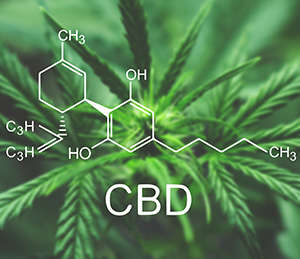Definition of CBD
CBD, or cannabidiol, is the second most prevalent active ingredient in the cannabis sativa plant (marijuana). CBD doesn’t contain tetrahydrocannabinol (THC), the psychoactive ingredient found in marijuana that produces a high. While studies are increasing, there are limits to the existing research: multiple small trials with conflicting results, RCTS and metareviews that too often include THC/CBD compounds rather than just pure CBD (and in varying amounts). According to the World Health Organization, “In humans, CBD exhibits no effects indicative of any abuse or dependence potential….there is no evidence of public health related problems associated with the use of pure CBD.” CBD has soared in popularity in recent years and is worked into so many products–from topicals to gummies to beverages.
Explore CBD research in the following databases:
PubMed Trip Cochrane*
*The Cochrane database requires users to enter the search term manually. Enter “CBD”
Research Spotlight
The databases often return hundreds of medical studies for a single wellness approach. This section summarizes a sampling of studies–providing a taste of the available research.
- Medicinal Cannabis (THC + CBD) Improved Sleep in Adults with Insomnia
A small, randomized, double-blind, placebo-controlled study from Australian researchers (2022) tested medicinal cannabis oil containing THC and CBD in people with insomnia and found it improved sleep quality and quantity. Levels of the sleep hormone melatonin increased by 30% and about 60% of participants were no longer considered to have insomnia at the end of a two-week period.
Access this study - 2023 Study Reveals How Cannabidiol Counters Epileptic Seizures
The strongest evidence for CBD is in treating childhood epilepsy syndromes, such as Dravet syndrome and Lennox-Gastaut syndrome, which typically don’t respond to antiseizure medications. In numerous studies, CBD was able to reduce the number of seizures or stop them altogether, which is why Epidiolex with CBD was approved by the FDA. This 2023 study from NYU Grossman School of Medicine explains why it works: CBD blocks signals carried by a molecule called lysophosphatidylinositol (LPI) found in brain neurons, which can be hijacked by disease to promote seizures. The study also clarified more broadly how circuits are balanced in the brain, so may have a broader impact in treating autism and schizophrenia.
Access this study - Low-Dose CBD Was More Effective Than Melatonin for Sleep Quality
A 2023 double-blinded randomized controlled trial from UCLA and Scripps Clinic Sleep Center assessed the efficacy of various formulations of CBD versus melatonin on sleep quality for 1,800 adults. Finding: low doses of CBD (15 mg) were safe and improved sleep quality in patients with a history of sleep disturbances, although these effects did not exceed that of 5 mg melatonin.
Access this study - Use of Cannabidiol in Anxiety and Anxiety-Related Disorders: A “Promising Role”
A 2019 metareview (6 small randomized controlled trials, 1 case series, 1 case report) found that CBD has a promising role as an alternative therapy in managing anxiety disorders. However, more studies with standardized approaches to dosing and clinical outcome measurements are needed to determine the appropriate dosing strategy and its place in therapy.
Access this study - CBD Metareview Shows “Scarce Evidence” for Impact on Variety of Mental Health Conditions
A comprehensive 2019 metareview published in The Lancet, which included 83 studies (40 of them RCTs) involving over 3,000 people with various mental health conditions, found that there was “scarce evidence” to show that cannabinoids improved depression or anxiety disorders, attention-deficit hyperactivity disorder, Tourette syndrome, post-traumatic stress disorder or psychosis. More High-quality studies are needed.
Access this study
View additional studies on CBD
Studies-in-Progress/Clinical Trials Underway
A clinical trial is any research study that assigns people to health-related interventions to evaluate the outcomes. “Interventions” include drugs, surgical procedures, devices, behavioral treatments, preventive care, etc.
- ClinicalTrials.gov: explore trials underway in the U.S.
- World Health Organization: explore trials happening across the globe. When you reach WHO’s search page, please type in “cannabidiol”
Access all studies currently available for CBD in these databases:
PubMed Trip Cochrane*
*The Cochrane database requires users to enter the search term manually. Enter “CBD”

























































